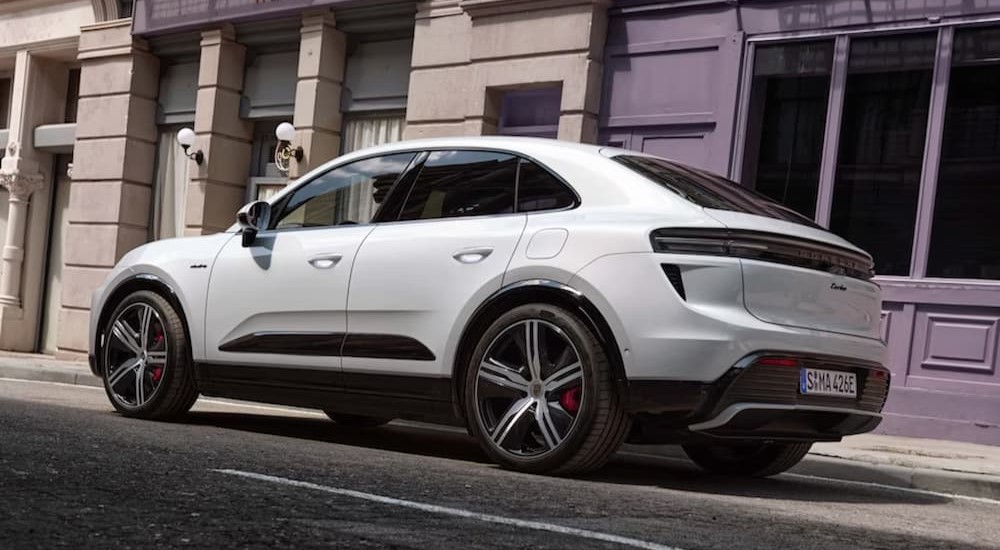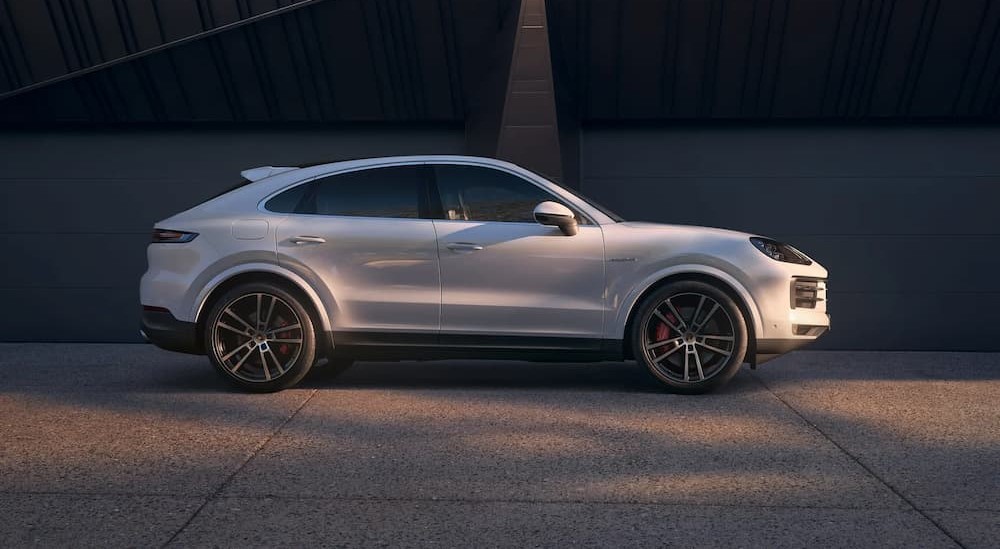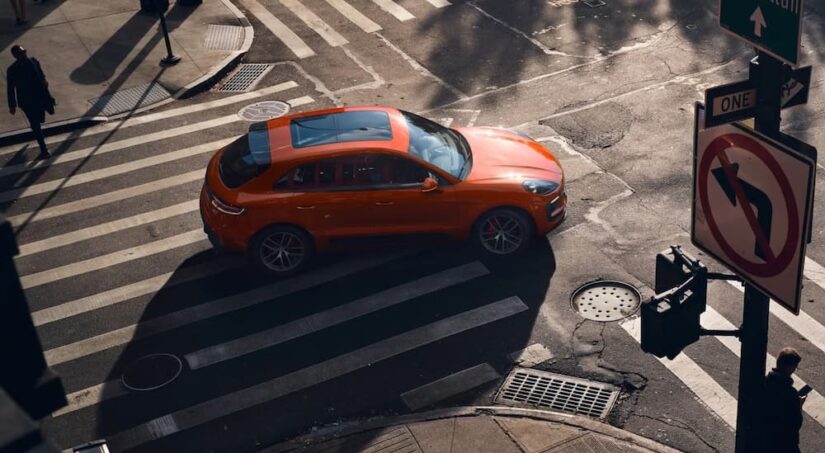While several automakers have stopped making sedans and hatchbacks altogether as SUVs rise in popularity among American drivers, Porsche is a brand that’s still largely known for its sleek sports cars, like the iconic Porsche 911. But the German automaker isn’t immune to the changing whims of the driving public, and there are now several SUVs proudly sporting the Porsche coat of arms.
Looking just at nameplates, you might think there are only two Porsche SUVs to choose from: the compact Macan and the midsize Cayenne. But dig into the assortment of variants, and you’ll find a much more robust variety of options. There are different powertrains, different types of equipment, and even different body shapes within the umbrella of a single model name. If you’re considering one of these luxury SUVs and are confused by the tangle of options, you’ve come to the right place. We’re going to lay out all of the options in the current lineup of Porsche SUV models and the differences between the many variants.
The Compact Macan
The smaller of the two Porsche SUV nameplates, the Macan is a compact crossover that’s well-regarded for its spry driving dynamics. While it’s a great vehicle to be behind the wheel of, it’s certainly less fun to be stuck in the cramped back seat, so those who regularly drive with more than one passenger should definitely take that into consideration. The Macan is undoubtedly stylish, no matter what variant you choose.
The Macan has many fans, but almost none of them think you get a good deal if you opt for the base model. Its 261 hp engine that delivers a 0-60 mph time of 6.0 seconds is certainly impressive compared to other SUVs but not terribly thrilling compared to what you get in higher trims. There are also a lot of driver assistance features that drivers take for granted even in non-luxury vehicles these days that do not come standard on the Macan, like forward collision warning, automatic emergency braking, and adaptive cruise control.
Macan T
The Macan T has the same powertrain as the base model, so don’t expect it to have much more oomph. However, it does come with the Sport Chrono Package, which puts drive mode and sport response buttons on the steering wheel for better performance. This drops its 0-60 mph time down to 5.8 seconds, according to Porsche. It also comes standard with adaptive air suspension for extra control.
Macan S
Upgrading to the Macan S is a more significant change. This model has a more powerful engine under the hood, a 3.0L twin-turbo V6 capable of producing 375 hp for a 0-60 time of 4.6 seconds. This is the option that really makes you feel that you’re driving a Porsche and is arguably the best value trim in the Macan lineup.
Macan GTS
At the top of the gas-powered Macan pack stands the GTS. This one has a twin-turbo V6 that’s even more powerful, churning out 434 hp and making the SUV capable of going from 0-60 mph in just 4.3 seconds. The GTS is also incredibly well-balanced, providing great driving dynamics on even the twistiest of roads. But while this top-tier version pulls out all the stops when it comes to performance, keep in mind that it still has issues like a cramped rear seat, minimal cargo space compared to other vehicles in its class, and a dearth of standard driver-assistance tech.
The Revolutionary Macan Electric
Looking to go green without sacrificing thrills? The EV version of the Macan has you covered. The all-electric powertrain of the Macan 4 Electric delivers 402 hp, with a 0-60 mph time of 4.9 seconds—better than both the base Macan and the Macan S. It’s capable of DC fast charging, allowing it to get from 10% to 80% charged in as little as 21 minutes. And since there’s no engine under the hood, you get some additional storage there.
Macan Turbo Electric
While the Macan 4 Electric fits neatly into the stats of the gas-powered Macan variants, the Macan Turbo Electric leaves them behind in the dust. This souped-up EV can produce 630 hp and a whopping 833 lb-ft of torque, letting it breeze from 0-60 mph in 3.1 seconds. Even the most hard-core EV skeptics will have a hard time putting their nose up at this one.

The Midsize Cayenne
The original Porsche SUV, the Cayenne, is a midsize model that provides significantly more space for passengers and cargo than the Macan. You might think that extra space (which means extra weight as well) would make the Cayenne the slower option, but it’s loaded up with extra power to compensate. While the base Macan has a 2.0L turbocharged four-cylinder engine, the Cayenne comes standard with a 348 hp V6 that gives it a 0-60 mph time of 5.7 seconds. But it doesn’t escape all of the Macan’s flaws: many luxury features come at a steep additional price, and almost no driver assistance tech comes standard.
Cayenne S
Like the Macan S, the Cayenne S provides an upgraded powertrain over the base model. The 4.0L V8 under the hood produces 468 hp. This shaves a full second off the 0-60 time, bringing it down to 4.7 seconds. The Cayenne S also comes with larger brakes to help you use that extra power safely.
The Powerful Cayenne E-Hybrid
Unlike the 2024 Macan, the 2024 Cayenne doesn’t have an all-electric variant. But it does have a plug-in hybrid version called the E-Hybrid. This pairs a turbocharged V6 internal combustion engine with an electric motor for a combined 463 hp. While that’s not as much as the V8 in the Cayenne S, the extra low-end torque the electric portion provides helps give the E-Hybrid a slightly lower 0-60 mph time of 4.6 seconds.
Cayenne S E-Hybrid
Put the S and the E-Hybrid together, and you get the S E-Hybrid. This combo doesn’t actually marry electric motors with the V8 under the hood of the non-hybrid S. However, it does use a more powerful turbocharged V6 alongside electric power to produce a combined 512 hp and zoom from 0-60 mph in 4.4 seconds.
Cayenne Turbo E-Hybrid
If you were disappointed to learn that the S E-Hybrid doesn’t have a V8 engine boosted by an electric motor, you will be happy to learn that you can have it all with the Turbo E-Hybrid. It’ll certainly cost you a pretty penny, of course (and it still won’t buy you standard adaptive cruise control). But if you can stomach the sticker price, you’ll be able to brag about a powertrain that produces a combined 729 hp and 700 lb-ft of torque and can get your SUV from 0-60 mph in a mere 3.5 seconds.

The Sporty Cayenne Coupé
The main difference between the Cayenne and the Cayenne Coupé is the shape of the body. The Coupé has a sleeker look that gives the exterior a more car-like appearance. This comes at the expense of cargo space and headroom for backseat passengers while also raising the starting price across the lineup. However, it does give you a sleeker profile that looks more sporty and aerodynamic.
We’re not going to go over all of the variants individually because they’re mostly the same as what you’ll find on the standard Cayenne. The Cayenne S and Cayenne S Coupé have the same powertrain; they just put it into different bodies. The same goes for the E-Hybrid, S E-Hybrid, and Turbo E-Hybrid. Horsepower figures are the same across the board, so the main thing to consider is which body style you like better.
Cayenne Coupé Turbo GT
One important variant that is exclusive to the Coupé version of the Cayenne is the Turbo GT. Its twin-turbo V8 engine produces 650 hp and 626 lb-ft of torque. That may not be the highest figure we’ve mentioned while discussing Porsche’s SUV lineup, but it more than gets the job done. With its 0-60 mph time of 3.1 seconds and top speed of 189 mph, the Turbo GT is the fastest Porsche SUV available. Unsurprisingly, it’s also the most expensive offering in the lineup, with a starting price of $196,300 for the 2024 model year.
What Does the Future Hold for Porsche SUVs?
That’s the Porsche SUV lineup as it stands for the 2024 model year. Clearly, it’s already an extensive lineup, with many variants and a good number of hybrid and electric options. But as electrification becomes more and more widespread, we can expect these SUVs to follow suit. Indeed, Porsche has already announced that a Cayenne EV is in the works. It’s currently slated for the 2026 model year, though, so it’ll take some time before you can get behind the wheel of one. We’ll be interested to see how the lineup continues to evolve in the future and whether new technology will make it possible for an SUV even larger than the Cayenne to have the performance power people expect from the Porsche brand. In the meantime, there are plenty of great options for luxury vehicle fans to choose from, even if they all fall under the purview of a mere two model names.



